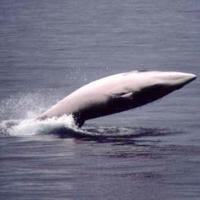|
"Iceland became a member of the International Whaling Commission again last year after 10 years' absence," Oddsson said. "Our membership now is made with a reservation against the ban on commercial whaling, and the Japanese government deserves our most heartfelt thanks for their invaluable assistance in enabling us to rejoin with this condition. On becoming a member Iceland undertook not to begin commercial whaling until 2006 at the earliest, but scientific whaling could start earlier. As ever, because of the small size of our home market it is a precondition for whaling off Iceland that it must be able to export the products, and in this respect we naturally look to Japan as our traditional market for them."
Referring to the Japanese research whaling, the Australian environment minister said, "We already have a situation in which, in the name of 'research', approximately 700 whales are killed each year for sale at market. This harvest adds nothing to our knowledge of whales that cannot be drawn from historical records and non-lethal research."
The Australian government hopes that other IWC signatory governments will also register protests to send a strong message to any countries intending to resume whaling without the support of the international community.
During the IWC vote on Iceland last October, Britain and the United States opposed Iceland's readmission. The United States took the position that the Icelandic reservation to the commercial whaling moratorium constituted a proposed amendment to the Schedule and had no legal effect until accepted by a vote of a three-fourths majority of the IWC members.
The United States believes that a country leaving the IWC, then rejoining with a reservation, "could undermine the effectiveness of the organization and could set a precedent for similar actions in other fisheries organizations," the U.S. State Department said in a statement at the time.
Sweden said its representatives made a "mistake" when they voted in favor of Iceland's IWC membership. But no other IWC signatory nation has registered a formal objection as Australia has done.
"Australia expects members of the IWC to participate on an equal basis to other Commission members," Dr. Kemp said. "More than a dozen other countries have joined the IWC over the past three years. None of these have attempted to exempt themselves from the moratorium or any other provisions of the Convention. Iceland should be as bound by the whaling ban as other members."
"Australia has consistently called for the cessation of this so-called scientific version of what is, in reality, commercial whaling. Any decision to expand existing whaling or to establish new industries strikes me as absurd, given the moratorium," Dr. Kemp said.
The issue will be heard at the next IWC meeting to be held in Berlin in June. The IWC's North Atlantic Minke Whale Assessment Group will gather before the main meeting to determine the health of this whale population that is the most likely target of Icelandic whalers.
"At this meeting," Dr. Kemp said, "Australia will continue the drive for the permanent cessation of commercial whaling, including lethal research, and for the establishment of a South Pacific Whale Sanctuary."
Top
|


